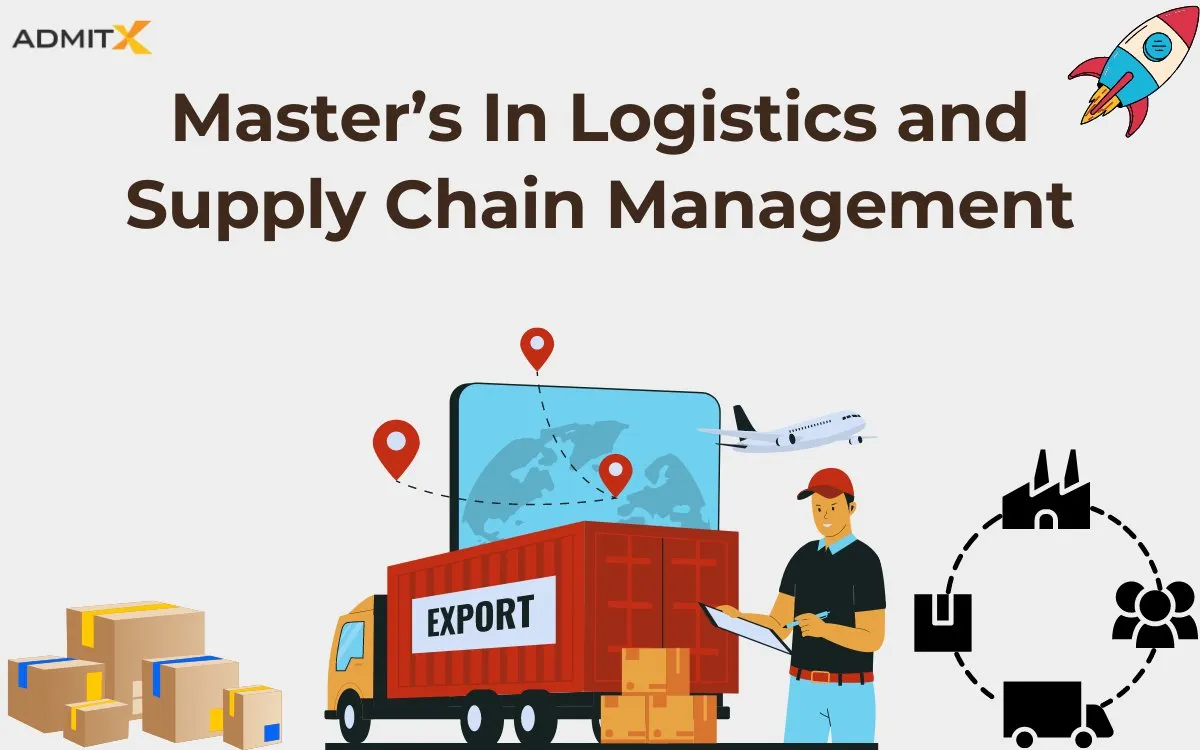
Master’s In Logistics and Supply Chain Management
Logistics management is the intricate process of overseeing the efficient movement of goods and services from their origin to their final destination.
This blog will help you understand what a Master’s in Logistics and Supply Chain Management is about. We’ll talk about the different things you’ll learn, the jobs you can get, and how they can help you build a successful career.
- Why Pursue a Masters in Logistics and Supply Chain Management?
- Top Universities For Pursuing Master’s in Logistics and Supply Chain Management
- Course Structure of Master's in Logistics and Supply Chain Management
- Careers After Master’s in Logistics and Supply Chain Management
- Prerequisite of Master’s in Logisitics and Supply Chain Management
- Conclusion
- FAQs
Why Pursue a Masters in Logistics and Supply Chain Management?
A Master’s in Logistics and Supply Chain Management is a unique opportunity that offers a comprehensive understanding of how businesses operate and interact. This program provides unique benefits that you won’t find in other fields. Here’s what you can gain:
- Strategic Thinking: You’ll learn to analyse complex supply chains, identify bottlenecks, and develop strategies to optimise efficiency and reduce costs.
- Leadership Development: The field demands strong leadership skills. A Master can equip you to manage teams, make critical decisions, and drive performance.
- Global Perspective: Supply chains often span continents. With a Master’s in Logistics and Supply Chain Management, you’ll not only develop a global mindset but also gain a deep understanding of international trade, customs, and logistics.
- Technological Proficiency: Logistics and supply chain management are increasingly reliant on technology. You’ll learn about advanced systems and data analytics to improve operations.
- High Demand, High Reward: The field of logistics and supply chain management is not only fascinating but also highly rewarding. Skilled professionals in this field are in high demand across various industries, offering excellent career prospects and competitive salaries.
Top Universities For Pursuing Master’s in Logistics and Supply Chain Management
There are many universities for pursuing Master of Science in Logistics and Supply Chain Management. This degree offers excellent research opportunities to international students which will ultimately help in getting a compelling career opportunities. Here are the top universities for Master’s in Logistics and Supply Chain Management:
| University | Course | Duration | Tuition Fees (annual) |
|---|---|---|---|
| University of Southampton | MSc in Logistics and Supply Chain Analytics | 12 months | GBP 31,200 |
| Arden University | MSc in Supply Chain and Logistics | 12 months | €15,000 |
| RMIT | Master’s in Supply Chain and Logistics | 24 months | AU$46,080 |
| University of Greenwich | MA in Logistics and Supply Chain Management | 12 months | GBP 18,150 |
| Kingston University | MSc in Logistics and Supply Chain Management | 12 months | GBP 18,700 |
| La Trobe University | Master of Logistic and Supply Chain Management | 24 months | AU$ 82,800 |
| University of Portsmouth | MSc Logistics and Supply Chain Management | 12 months | GBP 19,200 |
| University of Manitoba | Master of Supply Chain and Logistics Management | 24 months | CA$43,500 |
| American Business School of Paris | MSc Logistics and Supply Chain Management | 24 months | €22,150 |
Also Read – Master’s in Supply Chain Management
Course Structure of Master’s in Logistics and Supply Chain Management
The specific course structure can vary between universities, but here’s a general overview of the core modules you might encounter in a Masters in Logistics and Supply Chain Management:
Core Modules
- Supply Chain Management
- Logistics Management
- Operations Management
- Procurement and Supply Management
- Supply Chain Finance
- Supply Chain Information Systems
- Supply Chain Risk Management
- Supply Chain Sustainability
Specialised Modules (Depending on the University)
- Global Supply Chain Management
- Supply Chain Strategy
- Supply Chain Modelling and Simulation
- Supply Chain and Logistics Innovation
- Supply Chain and Operations Management Research Methods
Dissertation or Research Project
Many programs end in a dissertation or research project, allowing students to apply their knowledge to a specific supply chain challenge or industry issue.
Careers After Master’s in Logistics and Supply Chain Management
A Master’s in Logistics and Supply Chain Management offers a versatile skill set, opening doors to various roles across different industries. Here are some jobs after Master’s in Logistics and Supply Chain Management:
| Job Posts | Average Salary (annual) |
|---|---|
| Production Planner | $58,000-$94,000 (INR 48-78 Lakhs) |
| Logistics Manager | $60,000-$94,000 (INR 50-78 Lakhs) |
| Supply Chain Manager | $87,000-$100,000 (INR 72-83 Lakhs) |
| Purchasing Manager | $61,000-$100,000 (INR 51-83 Lakhs) |
| Procurement Manager | $84,000-$100,000 (INR 70-83 Lakhs) |
| Commodity Manager | $100,000-$200,000 (INR 83 Lakhs-1 cr) |
Prerequisite of Master’s in Logisitics and Supply Chain Management
Gaining admission to a Master’s in Logistics and Supply Chain Management program abroad typically requires meeting specific criteria. Here’s a general overview:
Academic Requirements
- Undergraduate Degree: Most universities require a bachelor’s degree in a relevant business, engineering, or economics field. However, some programs may consider applicants with degrees in other disciplines.
- Academic Performance: A solid academic record is crucial. The minimum GPA of 3.0 required can vary between universities, but a good academic standing is generally expected.
Standardised Tests
While not always mandatory, many programs require applicants to take standardised tests to assess their aptitude and English language proficiency:
- GMAT or GRE: These tests measure analytical, quantitative, and verbal reasoning skills. While GMAT is more commonly accepted for business-related programs, some universities may also accept GRE scores.
- English Proficiency: International students must demonstrate their English language skills through tests like IELTS (6.5-7) or TOEFL (90). The required scores vary depending on the university and program.
Additional Requirements
- Work Experience: Some programs prefer or require applicants to have relevant work experience in logistics, supply chain, or a related field.
- Letters of Recommendation: Strong letters of recommendation(2-3) from academic or professional references can enhance your application.
- Statement of Purpose: A well-written statement outlining your career goals, academic interests, and reasons for pursuing the program is essential.
- Resume or CV: A clear and concise document highlighting your education, work experience, and achievements.
Conclusion
In conclusion, a Master’s in Logistics and Supply Chain Management provides a strong foundation for a successful career. With a focus on strategic thinking, problem-solving, and global business, graduates are well-prepared to contribute to the efficient and effective operation of organisations worldwide.
FAQs
Can I do an MBA after a Master’s in Logistics Management?
You can pursue an MBA after completing a Masters in Logistics Management. An MBA can provide you with a broader business perspective, which can be beneficial if you aim for senior management roles in logistics or supply chain.
What is the scope of a Master’s in Logistics and Supply Chain Management abroad?
Graduates can work as supply chain analysts, logistics managers, procurement managers, or supply chain consultants. The field is growing rapidly, offering excellent job prospects and opportunities for career advancement.
What is the difference between logistics and supply chain management?
Logistics is a subset of supply chain management. Logistics focuses on the efficient movement and storage of goods, while supply chain management encompasses the entire process, from sourcing raw materials to delivering finished products to the customer.
What skills and knowledge will I gain after pursuing Master’s in Logistics and Supply Chain Management?
The program will equip you with skills in demand planning, inventory management, transportation, warehousing, supply chain analytics, and optimisation. You will also develop a strong understanding of global supply chains, risk management, and sustainability.
What industries offer the best job prospects for Logistics and Supply Chain Management graduates?
Graduates with a Master’s in Logistics and Supply Chain Management have a wide range of career options across various industries. Some of the most prominent sectors include e-commerce, retail, healthcare, manufacturing, and transportation. The field is experiencing rapid growth, creating ample opportunities for skilled professionals.
If you are an aspirant looking to study at your dream university, book an appointment with AdmitX today and start your applications early to avail yourself of all the benefits.








